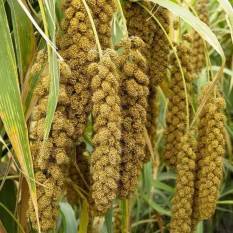DEHRADUN, 22 April 2025: In a bid to revolutionize agriculture in Uttarakhand’s hill regions, Agriculture Minister Ganesh Joshi has announced a comprehensive millet cultivation initiative as part of the state’s newly launched Millet Policy.
During a press conference at the Secretariat’s Media Centre, Joshi outlined key strategies to enhance agricultural productivity, provide farmers with better incomes, and curb the ongoing migration from the state’s mountainous areas.
The state government’s new approach focuses on promoting the traditional Barhanaja (Twelve cereals) millets, alongside high-value fruits like kiwi and dragon fruit under horticulture initiatives. These efforts are designed to improve self-employment opportunities, boost farmer earnings, and foster sustainable agricultural practices in the region.
"The Millet Policy 2025–26 is a major step towards revitalizing Uttarakhand’s hill agriculture," said Joshi, stressing that the policy will be implemented across 11 hill districts. The plan aims to encourage scientific and modern farming methods for key millets like Mandua (Finger Millet), Kauni (Foxtail Millet), and Jhangora (Barnyard Millet), which are staples in the local diet.
Phased Implementation of Millet Cultivation
The millet cultivation initiative will roll out in two phases. The first phase, spanning 2025–2028, targets the expansion of millet cultivation to 30,000 hectares across 24 development blocks. The second phase, from 2028 to 2031, will see an additional 40,000 hectares dedicated to millet farming across 44 development blocks.
Key to the success of this initiative, according to Joshi, will be providing subsidies on seeds and bio-fertilizers, which will be offered at 80% off market rates. Additionally, farmers will receive incentives for sowing techniques, including Rs 4,000 per hectare for row sowing and Rs 2,000 for direct sowing. Group-based support will also raise millet crop adoption incentives to Rs 300 per quintal from the previous Rs 150.
Joshi also announced plans to establish a Millet Processing Unit in each development block, along with recognizing and felicitating two farmer groups per block for exceptional contributions to millet farming. The Nutri Hub Project, with an investment of Rs 134.89 crores, will further support this initiative and target over 3 lakh farmers.
Horticulture Advancements with Kiwi and Dragon Fruit
In addition to millets, the state is focusing on high-value horticultural crops. The newly introduced Uttarakhand Kiwi Policy (2025–31) will incentivize the establishment of kiwi orchards with 70% state subsidies, covering 3,500 hectares and benefiting 17,500 farmers. The policy aims to increase kiwi production from 382 metric tons to 33,000 metric tons, supported by a budget of Rs 894 crores.
Joshi also highlighted the Dragon Fruit Farming Scheme, which will be implemented by 2028 in seven districts, providing an 80% subsidy for orchard establishment. The scheme targets 228 acres of dragon fruit cultivation, benefitting 450 farmers, with a total budget of Rs 15 crore.
Post-Harvest Management for Apples
To improve the post-harvest handling of apples, the state government has launched a Post-Harvest Management Scheme (2024–32) with an outlay of Rs 129.97 crores. This initiative includes the establishment of 22 Controlled Atmosphere (CA) storage units, offering subsidies ranging from 15% to 70% for both private firms and Farmer Producer Organizations (FPOs).
Micro Food Enterprise Upgradation
In line with efforts to increase local employment, Joshi mentioned the Mukhyamantri Micro Food Enterprise Upgradation Scheme, which provides up to Rs 5 lakhs for food processing units in hill regions. This initiative aims to benefit 780 units, thereby fostering rural job creation.
Minister Joshi concluded by reiterating the government’s commitment to addressing unemployment and migration in Uttarakhand’s rural areas through these forward-thinking policies. He expressed confidence that the promotion of millet cultivation, high-value fruit farming, and group-based production would create sustainable livelihoods for farmers and reduce the ongoing exodus from the state’s hills.
Image credit: agrifarming.in




















